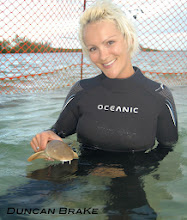Today my mom has continued her journey as an environmentalist teaching 6th graders about sharks and shark conservation. She has shared a real life research project that students can study from and has even spent 2 weeks tagging sharks in Australia. This is her own initiative that she has taken above and beyond the standard curriculum.


She always asks if I can speak to her class about sharks and shark conservation. I do not get home often, but when I do I always try to get in. The 6th graders are one of my favorite ages to speak to because they have a base understanding of environmental factors and can critically think about the issues. Many of them are aware of shark finning and I am always pleasantly surprised with the insight they share.

Some people may thinking that showing 11 and 12 year olds an image of dead sharks, bleeding and without their fins is too much, but I think it can be done effectively. Many of these kids have seen Jaws and other “R” rated movies, so they are not shocked. Many, however, cannot believe that this is happening and it catalyzes an instant empathy for the animals. They want to know why people do it and how to stop it. This is the energy and enthusiasm that it will take to make changes in the world.

Duncan and I shared images and video of shark tagging, shark diving and even the birth of baby lemon sharks. We also discussed what each of them could do to help the environment. Because they are young, they often feel that there is nothing they can do, but we strive to express that there is so much.

The last class we spoke to had one student that really hit home with me about why I do this. When we were talking about shark fin soup he raised his hand and said that his dad had eaten it a few times and mentioned that it was expensive. In a class full of kids that are ready to attack anyone hurting a shark, this was a bold admittance. It was also the ideal opportunity to reach out to this student and his dad. When we moved on to discuss diving with shark I suggested that he talk to his dad about getting in the water with sharks instead of eating them. He smiled and shook his head in agreement.
I am sure he went home and shared the idea with his dad also explaining that shark fin soup is toxic and destroying our oceans. Now either his dad told him that I don’t know what I am talking about or he actually listened. I am hoping that the second scenario played out and that it fosters a sense of change in his dad. As children we look up to our parents and no matter what we do not seem to question their actions. They are often our heroes and can do no wrong. His father has a chance to be an ocean hero for his son and for the environment.
It is these students and the students that have parents that sport fish for sharks that make speaking in classrooms worth it. Most students may already care about the ocean and already have parents that are involved in conservation or at least not killing or eating sharks. It is the parents that are participating in unsavory activities that are the goal. They are the people I want to reach and going through their son or daughter carries tremendous strength. I remember coming home from school when I was 7 or 8 and seeing a deer hanging in a tree at the house. I am from Maine and deer hunting is very popular, so this was not I new sight for me. This was however, the first time I had seen it at my house. I asked my dad why he killed the deer? My dad still talks about it to this day and describes the look of confusion and sadness on my face. He has not hunted since. Children hold a tremendous weight and they are a crucial element in the push to save our oceans.
I look forward to the next opportunity to be in the classroom and reach even just one student who will make a change.
Thank you to Berwick Academy in South Berwick, Maine for allowing your students the opportunity to experience real life conservation in action and to be apart of it. Thank you to my mom, Susan Morris for always being an environmentalist and making a difference.
For more information on shark conservation presentations please feel free to contact ME

I was out on a boat a couple of months ago with the Dept of Environment, and we were tagging and releasing sharks. Except on the day I went, we didn't get any.
ReplyDelete